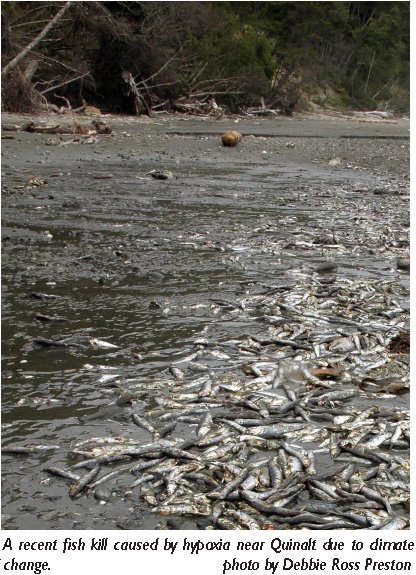Climate Change and Fish: We're All ResponsibleBy Steve Robinson
One species we must protect is the salmon, a keystone species so many others depend upon. We can do it, if we work together. Indian, non-Indian. Government, non-government. If we find a way to call each other brother and sister, we can find solutions to any challenge, anywhere, any time. The biggest of all environmental challenges right now is climate change, brought upon through our wanton over-exploitation, and the biggest tools available to fight it are respect and teamwork. Imagine a Northwest without salmon. Unthinkable as that thought is, the Coast Salish people of the Salish Sea know from their own observation and scientific modeling that climate change could lead to such a disaster. Salmon are the backbone of our economy and the cultural spirit and way of life of the Northwest, but they are definitely in trouble. Carbon dioxide levels could double by 2050, meaning many remaining salmon species would move to the poles, leading to extinction in the Northwest and most of Canada. Climate change is more than just some afterthought problem that sits on the heap of other environmental challenges we face. Rather it is the culmination of 100 years of greedy people searching for resources and not really caring who or what they push out of the way to get them. It is Nature slapping back at man for the insensitivity he has demonstrated for the past seven generations. Now our glaciers are melting. Our waters are turning into acid and hypoxia kills everything in its path. As goes the habitat, so go the fish. If people fought half as hard to save the salmon as salmon fight to save themselves, we would find ourselves back in a day when you could cross streams and even mighty rivers walking on their backs. But from the time of the industrial revolution we have instead polluted the rivers, uprooted the uplands and in a thousand other ways managed to turn their homes into places where their struggle to survive is in question. One of the greatest challenges related to climate change is, of course, the acidification of our waters. With the oceans absorbing more than 1 million tons of carbon dioxide an hour, a recent National Research Council study found acid in the oceans is increasing at an unprecedented rate, threatening to change marine ecosystems. The council said the oceans are 30 percent more acidic than before the start of the Industrial Revolution roughly 200 years ago, and one-third of today's carbon dioxide emissions are absorbed by the oceans. Unless emissions are reined in, ocean acidity could increase by 200 percent by the end of the century and even more in the next century. Ocean acidification is changing the chemistry of the oceans at a scale and magnitude greater than thought to occur on Earth for many millions of years and is expected to cause changes in the growth and survival of a wide variety of marine organisms, potentially leading to massive shifts in ocean ecosystems. The effects of growing ocean acid levels might be more pronounced off the Northwest coast. Cold water absorbs more carbon dioxide than warm water. A phenomenon known as "upwelling" off the coast of Washington state and Oregon brings deep ocean water already more acidic to the surface, where it is saturated with even more carbon dioxide. According to one study, upwelling of acidified water off the West Coast has already reached levels not previously anticipated until 2050. Acidification is a direct result of climate change and the release of greenhouse gases into the atmosphere. Hypoxia is another direct result. We are experiencing it in Capitol Lake, as algae dies and absorbs the oxygen from the water, everything living dies - except unwanted invasive species like the mud snail. Hypoxia is being witnessed in bays of Puget Sound, in Hood Canal and off the coast. It is, unfortunately, a sign of things to come - until we are able to stop the flow of CO2 into the atmosphere, and increase the flow of fresh water into the marine areas through habitat restoration projects. We have to protect and restore wetlands, riparian areas, healthy open grasslands and sustainable forestlands. These are issues that affect us all, and everyone must get involved and take action. Our children need to break away from their video games and plant trees. Our elders need to teach and be respected in the process. The rest of us need to get serious about the issue and, starting at home, conserve fuels and work toward alternate energies and support the restoration of habitat that will return clean, fresh water to our Sound and Sea. It's our Earth. Let's take care of it! Steve Robinson is a SPEECH board member and a policy analyst for the NW Indian Fisheries Commission.
Back to Home page. |

 Those of us fortunate enough to live in the South Sound don't have to go far to see, hear and experience an incredible body of water that connects with the oceans of the world, with all the lands and all of the fantastic forms of life, each and every one of which interconnect with our own. Every year, dozens of these species disappear from this planet - never to be seen again - and each time that happens, it is a tragedy beyond measure. A piece of us... dies.
Those of us fortunate enough to live in the South Sound don't have to go far to see, hear and experience an incredible body of water that connects with the oceans of the world, with all the lands and all of the fantastic forms of life, each and every one of which interconnect with our own. Every year, dozens of these species disappear from this planet - never to be seen again - and each time that happens, it is a tragedy beyond measure. A piece of us... dies.